Guest blogged by Jon Ponder, Pensito Review.
Repercussions continue to shake out in the wake of the release this week of a National Intelligence Estimate (NIE) that says Iran abandoned its nuclear weapons program four years ago.
At a news conference yesterday, George Bush denied knowing that U.S. intelligence had learned the Iranian program had been suspended when he warned the American people last month that Iran was on the verge of launching World War III. He was not lying, Bush suggested, but rather his own incompetence and famous lack of curiosity led him to give the false warning. Bush said that when Director of National Intelligence (DNI) Mike McConnell told him in August that new information about the Iranian nuclear program had come to light, he simply did not bother to ask the DNI about the nature of the new developments.
If the muted response to this assertion, from reporters at the news conference, is a guide, journalists close to the White House appear to believe that while it may be unacceptable for Bush to lie to them, it is perfectly okay for him to issue false predictions about an impending apocalypse if the warnings are based entirely on his ineptitude as commander-in-chief and his personal lack of curiosity.
As if all of that isn't a sorry enough state of affairs, today we learn that Dick Cheney has known about --- and actively suppressed --- the intelligence community's finding for over a year. In particular, Cheney knew that Iran suspended its weapons program when he made this statement on Oct. 21, 2007, in an address to a Washington think tank...
"Our country, and the entire international community, cannot stand by as a terror-supporting state fulfills its grandest ambitions ... The Iranian regime needs to know that if it stays on its present course the international community is prepared to impose serious consequences."
Yesterday, on CNN, New Yorker reporter Seymour Hersh reminded viewers that he'd reported on White House efforts to suppress the NIE last November:
The intelligence we learned about yesterday has been circulating inside this government at the highest levels for the last year --- and probably longer.
The complete transcript of Hersh's interview on CNN follows below...
Sy Hersh is joining us now live here in THE SITUATION ROOM.
He also wrote an article in November of last year, 2006: "The Next Act: Is A Damaged Administration Less Likely to Attack Iran or More?," in which you said there was a new National Intelligence Estimate circulating, suggesting they didn't really have a nuclear weapons program that was ongoing any longer.
SEYMOUR HERSH, "THE NEW YORKER": Exactly right.
BLITZER: So what do you think?
HERSH: Well, I...
BLITZER: I mean if you knew that a year ago, you know, what does that mean?
HERSH: At the time, I wrote that there was a tremendous fight about it, because Cheney in the White House --- the vice president did not want to hear this. So that there was a fight about that intelligence. And, actually, for the last year, I think the vice president's office pretty much has kept --- you know, the vice president has kept his foot on the neck of that report. That report was bottled up for a year.
The intelligence we learned about yesterday has been circulating inside this government at the highest levels for the last year --- and probably longer.
BLITZER: All right. But you were suggesting that there was a real run-up to a war developing within the administration, even as there were some in the administration and the intelligence community suggesting, hey, hold off --- maybe they did suspend or freeze their nuclear weapons program.
HERSH: Of course. And I think it's still not over. I mean it...
BLITZER: Well, look, because I want to press you on this.
Does that mean now that this new NIE has been released publicly, it is over, the run-up toward a potential military confrontation with Iran?
HERSH: There's always Israel.
BLITZER: What does that mean?
HERSH: Well, that means that Israel can always decide unilaterally to take action or with us, covertly. Israel objects to this report. I am told that Olmert had a private discussion with Bush about it during Annapolis --- before Annapolis. Bush briefed him about it. The Israelis were very upset about the report. They think we're naive. They don't think we get it right.
And so they have a different point of view. And this is a serious breach (INAUDIBLE)...
BLITZER: Well, let me ask you this, is it possible that this new NIE --- because we know that the 2005 NIE was wrong, the 2002 NIE on Iraq's weapons of mass destruction was wrong.
Is it possible this new one that has just been made public, declassified, is it possible they got it wrong again?
HERSH: It's been four years since we've had any positive evidence of a parallel secret program to build a bomb. And we've been all over the country. One of the things that that NIE, that they finished last year, actually, that they were working on last year, it was a result of a lot of covert operations. I also was writing about the fact that we had people on the ground inside. We checked every place we thought there was some secret activity and we found nada --- nothing.
So, sure, it's possible. Everything's possible. But this is --- this is a pretty remarkable document, given the hostility to it inside the White House that it's been made public.
BLITZER: It's pretty amazing when you look at, from many respects, and certainly from your respect. You probably feel vindicated. You know, you were hammered --- and we were hammered for giving you some air time on "LATE EDITION," our Sunday show.
I want to play for you a clip of what the White House press secretary, Dana Perino, said the last time you were interviewed by me.
Listen to this.
(BEGIN VIDEO CLIP)
DANA PERINO, WHITE HOUSE PRESS SECRETARY: Every two months or so, Sy Hersh writes an article in "The New Yorker" magazine and CNN provides him a forum in which to talk about his article and all the anonymous sources that are quoted in it.
(END VIDEO CLIP)
BLITZER: All right. So you heard that from the White House press secretary. And, you know, we went back and took a look at what you wrote more than a year ago. And you had some pretty good information in there.
HERSH: Well, you know, they also criticized me --- if you remember, I went on your show repeatedly about Abu Ghraib. We did long interviews about it. And they were saying, oh --- literally, senior officials said he's throwing, you know, crap against the wall to see what sticks. So this has been consistent.
What's interesting here is the president's position. As you know, today in his news conference, he said he only learned about this the other week.
BLITZER: He said he only got the word from Mike McConnell, the national intelligence director, last week, that there was, in fact, now a new National Intelligence Estimate, although last August he was told there's some new information. We haven't vetted it. It's not yet confirmed. There may be some new information. He only says he learned about the new NIE last week.
HERSH: Look, it's a lose-lose for them. Either he didn't know what was going on at the highest levels --- the fight I'm talking about began last year. I was writing about something in November and also, you mentioned earlier, they were aware of a big dispute inside the community --- that is, between the White House and the community about this. Now, maybe he didn't know what was going on at the vice presidential level about something that serious. If so, I mean we pay him to know these things and not to make statements based on information that turned out not to be accurate. Or else he's misrepresenting what he knows. I don't think there's any question, this is going to pose a serious credibility problem. I assume people are going to be asking more and more questions about what did he know when. And his statement that McConnell comes to him --- the head of the intelligence services of the United States --- and says I have something serious to say to you and he says great, let me know when I want to hear it, is, you know --- it's his words and we can only say that if that's true, you know, that's --- that's not what we pay the guy to do.
BLITZER: The former U.S. ambassador to the United Nations, John Bolton, was here in THE SITUATION ROOM in the last hour. He's a hard- liner, as you know, when it comes to Iran. He says maybe this new NIE has been politicized and says they may get it wrong still. And he told me this.
Listen to this.
(BEGIN VIDEO CLIP)
JOHN BOLTON, FORMER U.S. AMBASSADOR TO THE U.N.: I think there is a very real risk here that the intelligence community is like generals fighting a last war --- they got Iraq wrong and they're overcompensating by understating the potential threat from Iran.
(END VIDEO CLIP)
BLITZER: What do you think?
Because, you know, he reflects a view that's still pretty prevalent out there, especially within the administration.
[HERSH]: Particularly within the vice president's office.
And, also, now --- you would have to say also within Israel. The Israelis think we're very naive about this. They say you guys don't know, you know, you're thinking about it the way Americans think --- not about how Middle Eastern people think.
And so this is literally, what I understand one of their arguments has been to the White House. Look, the bottom line is that we haven't been able to find evidence. And we need evidence. We deal with evidence. We can't find evidence of any ongoing secret parallel weapons program --- period. And we know that the program they have now has gone nowhere --- period.
We report that the NIE was careful to say it's possible that they may get some fissile material from a third country. It's possible they may solve their problems.
But I can tell you, John Negroponte was telling Congress privately in the last few months, it could be as long as 10 years before they really are in a position to get a bomb.
BLITZER: And in the report, the NIE, they said maybe 2015, if they were to reactivate that program. But under the Nuclear Non- Proliferation Treaty, they are entitled to enrich uranium, which they say they're doing for peaceful purposes.
HERSH: Tell that to the president. The president's view on this, I think, is pretty tough. His view is simply --- his negotiating position, as I understand it from inside, they have to stop everything, not just --- end it. Destroy it. Get rid of all the centrifuges. Inspectors have to come in that we pick, that we recognize as rational, go inside Iran and verify that they have gotten rid of the program. That's his standard. He's not saying that publicly, but that's the private standard, so I understand.


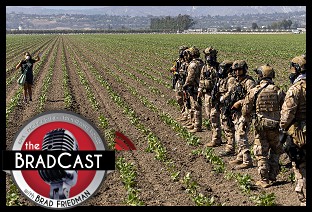 Trump Labor Dept. Warns Trump Policies Sparking Food Shortage, Farmworker Crisis: 'BradCast' 10/9/25
Trump Labor Dept. Warns Trump Policies Sparking Food Shortage, Farmworker Crisis: 'BradCast' 10/9/25 'Green News Report' 10/9/25
'Green News Report' 10/9/25
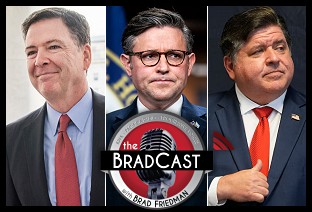 Trump's Losing Battles: 'BradCast' 10/8/25
Trump's Losing Battles: 'BradCast' 10/8/25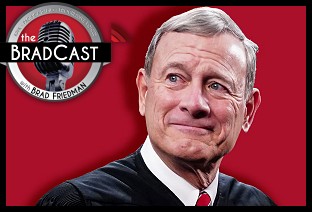 'Supreme Arrogance': Trump, John Roberts and His Stacked, Packed and Captured SCOTUS: 'BradCast' 10/7/25
'Supreme Arrogance': Trump, John Roberts and His Stacked, Packed and Captured SCOTUS: 'BradCast' 10/7/25 'Green News Report' 10/7/25
'Green News Report' 10/7/25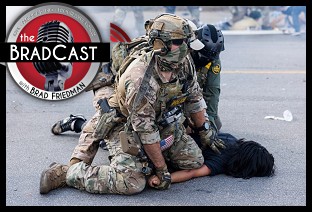 Trump Attempting His
Trump Attempting His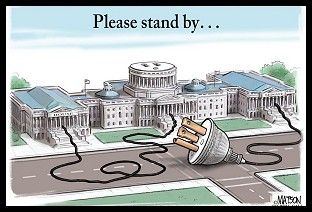 Sunday 'Shutshow' Toons
Sunday 'Shutshow' Toons Biden Budget Expert: Mass Firings in Shutdown 'Extremely Illegal': 'BradCast' 10/2/25
Biden Budget Expert: Mass Firings in Shutdown 'Extremely Illegal': 'BradCast' 10/2/25 'Green News Report' 10/2/25
'Green News Report' 10/2/25 Why is DOJ Suing 'Blue' States for Their Voter Databases?: 'BradCast' 10/1/25
Why is DOJ Suing 'Blue' States for Their Voter Databases?: 'BradCast' 10/1/25 'A War from Within' Trump's Twisted Mind: 'BradCast' 9/30/25
'A War from Within' Trump's Twisted Mind: 'BradCast' 9/30/25 'Green News Report' 9/30/25
'Green News Report' 9/30/25 'Fear is the Tool of a Tyrant':
'Fear is the Tool of a Tyrant': Sunday 'Long Arm/Small Man' Toons
Sunday 'Long Arm/Small Man' Toons 'Green News Report' 9/25/25
'Green News Report' 9/25/25 I Don't Know What This Means, But I Thought You Should Know: 'BradCast' 9/25/25
I Don't Know What This Means, But I Thought You Should Know: 'BradCast' 9/25/25 Gov't Shutdown Looms as Dems Fight to Save Healthcare Subsidies: 'BradCast' 9/24/25
Gov't Shutdown Looms as Dems Fight to Save Healthcare Subsidies: 'BradCast' 9/24/25 Updates: Homan Bribery; Kimmel Censorship; Our Insane Prez at U.N.: 'BradCast' 9/23/25
Updates: Homan Bribery; Kimmel Censorship; Our Insane Prez at U.N.: 'BradCast' 9/23/25 Trump 'Border Czar' Took $50k in Sting, DOJ Dropped the Case: 'BradCast' 9/22/25
Trump 'Border Czar' Took $50k in Sting, DOJ Dropped the Case: 'BradCast' 9/22/25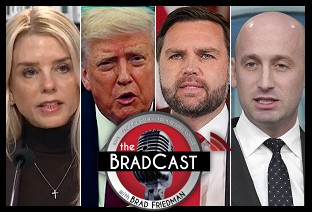 MAGA Exploiting Kirk's Death as Their 9/11: 'BradCast' 9/17/25
MAGA Exploiting Kirk's Death as Their 9/11: 'BradCast' 9/17/25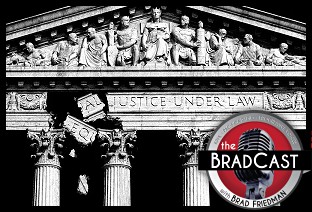 Our Crumbling Courts and Withering Rule of Law: 'BradCast' 9/16/25
Our Crumbling Courts and Withering Rule of Law: 'BradCast' 9/16/25 After Kirk Murder, 1st Amendment, Not 2nd, Under Attack: 'BradCast' 9/15/25
After Kirk Murder, 1st Amendment, Not 2nd, Under Attack: 'BradCast' 9/15/25 SCOTUS Suspension of 4th Amendment an Ominous Threat to Constitutional Republic
SCOTUS Suspension of 4th Amendment an Ominous Threat to Constitutional Republic
 VA GOP VOTER REG FRAUDSTER OFF HOOK
VA GOP VOTER REG FRAUDSTER OFF HOOK Criminal GOP Voter Registration Fraud Probe Expanding in VA
Criminal GOP Voter Registration Fraud Probe Expanding in VA DOJ PROBE SOUGHT AFTER VA ARREST
DOJ PROBE SOUGHT AFTER VA ARREST Arrest in VA: GOP Voter Reg Scandal Widens
Arrest in VA: GOP Voter Reg Scandal Widens ALL TOGETHER: ROVE, SPROUL, KOCHS, RNC
ALL TOGETHER: ROVE, SPROUL, KOCHS, RNC LATimes: RNC's 'Fired' Sproul Working for Repubs in 'as Many as 30 States'
LATimes: RNC's 'Fired' Sproul Working for Repubs in 'as Many as 30 States' 'Fired' Sproul Group 'Cloned', Still Working for Republicans in At Least 10 States
'Fired' Sproul Group 'Cloned', Still Working for Republicans in At Least 10 States FINALLY: FOX ON GOP REG FRAUD SCANDAL
FINALLY: FOX ON GOP REG FRAUD SCANDAL COLORADO FOLLOWS FLORIDA WITH GOP CRIMINAL INVESTIGATION
COLORADO FOLLOWS FLORIDA WITH GOP CRIMINAL INVESTIGATION CRIMINAL PROBE LAUNCHED INTO GOP VOTER REGISTRATION FRAUD SCANDAL IN FL
CRIMINAL PROBE LAUNCHED INTO GOP VOTER REGISTRATION FRAUD SCANDAL IN FL Brad Breaks PA Photo ID & GOP Registration Fraud Scandal News on Hartmann TV
Brad Breaks PA Photo ID & GOP Registration Fraud Scandal News on Hartmann TV  CAUGHT ON TAPE: COORDINATED NATIONWIDE GOP VOTER REG SCAM
CAUGHT ON TAPE: COORDINATED NATIONWIDE GOP VOTER REG SCAM CRIMINAL ELECTION FRAUD COMPLAINT FILED AGAINST GOP 'FRAUD' FIRM
CRIMINAL ELECTION FRAUD COMPLAINT FILED AGAINST GOP 'FRAUD' FIRM RICK SCOTT GETS ROLLED IN GOP REGISTRATION FRAUD SCANDAL
RICK SCOTT GETS ROLLED IN GOP REGISTRATION FRAUD SCANDAL VIDEO: Brad Breaks GOP Reg Fraud Scandal on Hartmann TV
VIDEO: Brad Breaks GOP Reg Fraud Scandal on Hartmann TV RNC FIRES NATIONAL VOTER REGISTRATION FIRM FOR FRAUD
RNC FIRES NATIONAL VOTER REGISTRATION FIRM FOR FRAUD EXCLUSIVE: Intvw w/ FL Official Who First Discovered GOP Reg Fraud
EXCLUSIVE: Intvw w/ FL Official Who First Discovered GOP Reg Fraud GOP REGISTRATION FRAUD FOUND IN FL
GOP REGISTRATION FRAUD FOUND IN FL

































